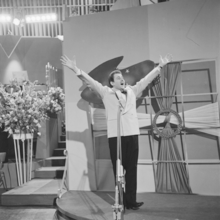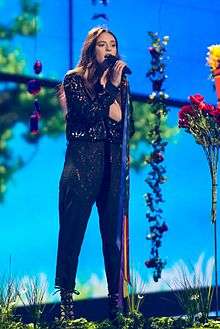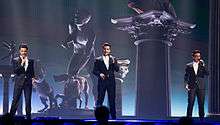Italy in the Eurovision Song Contest
| Italy | |
|---|---|
|
| |
| Member station | RAI |
| National selection events |
Internal Selection
|
| Appearances | |
| Appearances | 42 |
| First appearance | 1956 |
| Best result | 1st: 1964, 1990 |
| Worst result |
Last: 1966 Nul points: 1966 |
| External links | |
| Italy official website RAI for ESC | |
| Italy's page at Eurovision.tv | |
|
Italy in the Eurovision Song Contest 2016 | |
Italy has participated in the Eurovision Song Contest 42 times since making its debut at the first contest in 1956. It was one of only seven countries that competed at the very first contest. Italy competed at the contest frequently until 1997. After a fourteen-year absence, the country competed in the Eurovision Song Contest 2011. Italy has won the contest twice.
In 1958, Domenico Modugno finished third with the song "Nel blu, dipinto di blu". Renamed "Volare", the song became a huge international hit, reaching the US number one spot. Emilio Pericoli also finished third in 1963, before Italy won for the first time in 1964 with Gigliola Cinquetti and "Non ho l'età". Cinquetti returned to the contest in 1974 and finished second with the song "Si", losing to ABBA. Italy then finished third in 1975 with Wess and Dori Ghezzi and the song "Era". The country's best result of the 1980s was Umberto Tozzi and Raf finishing third in 1987. Italy's second victory in the contest came in 1990 with Toto Cutugno and the song "Insieme: 1992". Other good 1990s results were Mia Martini in 1992 and Jalisse in 1997, who both finished fourth. After 1997, Italy withdrew from the competition.
The EBU announced that they would work harder to bring Italy back to the contest in 2010, along with former participants Monaco and Austria,[1] but again Italy did not participate in the contest.
On 31 December 2010, it was officially announced by the EBU that Italy would be returning to the contest as part of the "Big Five", meaning that it automatically qualified for the final of the 2011 contest.[2] Italy's return to the contest proved to be successful, with Raphael Gualazzi finishing second.
Italy has finished in the top ten in four of the last six contests (2011–16). In 2015, Il Volo won the televoting receiving votes from all countries, but the juries placed them sixth, ending with a third place overall. Since the introduction of the 50/50 voting system in 2009, this was the first time that the winner of the viewers vote did not win the contest.
History
Absences
Italy has withdrawn from the Eurovision Song Contest a number of times. The first withdrawal was in 1981, when RAI stated that interest had diminished in the country.[3] This absence continued through the following year, before Italy returned in 1983. Italy again withdrew in 1986 when RAI decided not to enter the contest. From 1994 to 1996 Italy withdrew again, with RAI citing a lack of interest in participating. Italy returned in 1997, before withdrawing again without explanation, and the country did not participate again until 2011.
None of the Eurovision winning songs were particularly successful in the Italian charts. "Non ho l'eta" by Gigliola Cinquetti (Grand Prix 1964) was a hit in February 1964 when the song won the Sanremo festival, but according to the official "Hit Parade Italia" website, "Waterloo", "Ding-A-Dong", "Puppet on a String", "Save Your Kisses for Me" and even Italy's own winning entry of 1990, "Insieme: 1992", all failed to enter the TOP 10 of the records sales charts. A notable exception to this rule was, however, the 1984 entry "I treni di Tozeur" by Alice and Franco Battiato which shared 5th position in the final but still became a #3 hit in Italy and was also placed at #20 on the chart of the best-selling singles in Italy of 1984.[4]
TV censorship of the Eurovision Song Contest 1974
Italy refused to broadcast the Eurovision Song Contest 1974 on RAI because of a song sung by Gigliola Cinquetti which coincided with the intense political campaigning for the 1974 Italian referendum on divorce which was held a month later in May. Despite the Eurovision contest's taking place more than a month before the planned vote, Italian censors refused to allow the contest and song to be shown or heard. RAI censors felt that the song, which was titled "Sì" (Yes), and which contained lyrics constantly repeating the aforementioned word could be accused of being subliminal messaging and a form of propaganda to influence the Italian voting public to vote 'yes' in the referendum ('yes' to repeal the law that allowed divorce). The song thus remained censored on most Italian state TV and radio stations for over a month. At the contest in Brighton, Cinquetti finished second, losing to ABBA. "Sì" went on to be a UK top ten hit, peaking at number eight. It also reached the German top 20.
A new interest?
However, in 2008 two noted Italian musicians, Vince Tempera (who had helped San Marino take part in the ESC in 2008) and Eurovision winner Toto Cutugno expressed their sorrow at Italy's non-participation and called for the country to return to the contest.[5][6]
Contestants from the 2008 contest, starting with the winner Dima Bilan appeared on the Italian show Carramba! Che fortuna, hosted by Raffaella Carrà on Rai Uno. Whether this was an initiative by Carrà (who presented three shows in TVE concerning the event) to try to bring Eurovision back to Italy is not clear, but Sietse Bakker, Manager Communications & PR of the Eurovision Song Contest, reiterated that "Italy is still very much welcome to take part in the competition."[7][8]
Shortly after revealing the list of participants for the 2009 Contest the EBU announced that, for the 2010 Contest, they would work harder to bring Italy back into the contest.[1]
Successful return to the contest
At a press conference presenting the fourth edition of the Italian X Factor, Rai 2 director Massimo Liofredi announced that the winner of the competition might advance to represent Italy in the Eurovision Song Contest, rather than participate in the San Remo Festival, as in previous years. On 2 December 2010, it was officially announced by the Eurovision Song Contest official website that Italy had applied to compete in the 2011 Contest.[9] Their participation was further confirmed on 31 December with the announcement of the official participant list.[2]
Italy's return to the contest after a 14-year absence has been successful, finishing in the top ten in four of the last six contests (2011–16). In 2011, Raphael Gualazzi finished second, Italy's best result since 1990. Italy actually came first with the jury vote, but only 11th in the televote to place second overall behind winners Azerbaijan. Nina Zilli in 2012 and Marco Mengoni in 2013 were able to achieve a top 10 position (9th and 7th respectively). This trend had a stop when Emma Marrone, selected internally, ended in 21st place, worst position ever of an Italian entry. In 2015, winners of Sanremo Il Volo finished third with 292 points, behind Sweden and Russia. Italy placed first in the televote with 366 points, but sixth in the jury vote. Since the introduction of the 50/50 split vote voting system, this was the first time that the winner of the televote did not win the contest. Francesca Michielin, selected among competitors of 2016 Sanremo Festival, ended in 16th place.
Italy and the "Big Five"
Since 2000, four countries - the United Kingdom, Germany, France and Spain - have automatically qualified for the final of the Contest regardless of their positions on the scoreboard in previous contests.[10] They earned this status by being the four biggest financial contributors to the EBU. Owing to their untouchable status in the Contest, these countries became known as the "Big Four". Executive Supervisor of the Contest Svante Stockselius told reporters in a meeting with OGAE Serbia that, if Italy were to return to the contest in the future, the country would also qualify automatically for the finals, becoming part of a "Big Five".[11][12] However, with the official announcement of the return of Italy, it was not confirmed whether the country would compete in one of the two semi-finals or whether it would be part of the "Big Five", as RAI, third largest contributor to the EBU, had not applied to be a member of "Big Five".[13] On December 31, it was announced that Italy would take part in of the Eurovision Song Contest 2011 and confirmed that the country would thereby automatically qualify for the final in Germany as part of the "Big Five".[2]
Contestants
- Table key
- NOTES:
- 1. ^ The full results for the first contest in 1956 are unknown, only the winner was announced. The official Eurovision site lists all the other songs as being placed second.
- 2. Italy has not ever competed in the semi-finals as it did not participate in 1996 (when all countries save for the previous year's winner had to go through a pre-selection jury) and has been a part of the "Big 5" since it rejoined the contest in 2011.
- 3. No semi-finals until 2003; did not participate between 2004 and 2010.
Voting history
As of 2016, Italy's voting history is as follows:
|
|
| |||||||||||||||||||||||||||||||||||||||||||||||||||||||||||||||
Hostings
| Year | Location | Venue | Presenters |
|---|---|---|---|
| 1965 | Naples | Auditorium RAI | Renata Mauro |
| 1991 | Rome | Teatro 15 di Cinecittà | Gigliola Cinquetti and Toto Cutugno |
Marcel Bezençon Awards
Press Award
| Year | Song | Performer | Final Result | Points | Host city |
|---|---|---|---|---|---|
| 2015 | "Grande amore" | Il Volo | 3 | 292 | Vienna |
Winners by OGAE members
| Year | Song | Performer | Final Result | Points | Host city |
|---|---|---|---|---|---|
| 2015 | "Grande amore" | Il Volo | 3 | 292 | Vienna |
Commentators and spokespersons
| Year(s) | Final Commentator | Spokesperson | Semi-Final Commentator |
|---|---|---|---|
| 1956 | Bianca Maria Piccinino | No Spokesperson | No Semi-Final |
| 1957 | Nunzio Filogamo | ||
| 1958 | Fulvia Colombo | ||
| 1959 | Enzo Tortora | ||
| 1960 | Giorgio Porro | ||
| 1961 | Corrado Mantoni | ||
| 1962 | Renato Tagliani | ||
| 1963 | |||
| 1964 | Rosanna Vaudetti | ||
| 1965 | Renato Tagliani | ||
| 1966 | Enzo Tortora | ||
| 1967 | Mike Bongiorno | ||
| 1968 | |||
| 1969 | |||
| 1970 | Enzo Tortora | ||
| 1971 | N/A | ||
| 1972 | |||
| 1973 | |||
| 1974 | Rosanna Vaudetti | Anna Maria Gambineri | |
| 1975 | Silvio Noto | ||
| 1976 | Rosanna Vaudetti | ||
| 1977 | Mariolina Cannuli | ||
| 1978 | Rosanna Vaudetti | ||
| 1979 | Paola Perissi | ||
| 1980 | Michele Gammino | Mariolina Cannuli | |
| 1981–1982 | No broadcast | Did not participate | |
| 1983 | Paolo Frajese | Paola Perissi | |
| 1984 | Antonio De Robertis | Mariolina Cannuli | |
| 1985 | Rosanna Vaudetti | Beatrice Cori | |
| 1986 | No broadcast | Did not participate | |
| 1987 | Rosanna Vaudetti | Mariolina Cannuli | |
| 1988 | Daniele Piombi | ||
| 1989 | Gabriella Carlucci | Peppi Franzelin | |
| 1990 | Peppi Franzelin | Paolo Frajese | |
| 1991 | No commentator | Rosanna Vaudetti | |
| 1992 | Peppi Franzelin | Nicoletta Orsomando | |
| 1993 | Ettore Andenna | Peppi Franzelin | |
| 1994–1996 | No broadcast | Did not participate | |
| 1997 | Ettore Andenna | Peppi Franzelin | |
| 1998–2010 | No broadcast | Did not participate | |
| 2011 | Raffaella Carrà and Bob Sinclar | Raffaella Carrà | Raffaella Carrà |
| 2012 | Filippo Solibello and Marco Ardemagni | Ivan Bacchi | Federica Gentile |
| 2013 | Filippo Solibello, Marco Ardemagni and Natasha Lusenti[15] | Federica Gentile[16] | |
| 2014 | Linus and Nicola Savino | Linus | Marco Ardemagni and Filippo Solibello |
| 2015 | Federico Russo and Valentina Correani (TV) Marco Ardemagni and Filippo Solibello (Radio) | Federico Russo | |
| 2016 | Flavio Insinna and Federico Russo | Claudia Andreatti | |
| 2017 | TBA | TBA | TBA |
Congratulations: 50 Years of the Eurovision Song Contest
- Table key
| Year | Artist | Language | Title | Final | Points | Semi | Points | Place (1958) | Points (1958) |
|---|---|---|---|---|---|---|---|---|---|
| 1958 | Domenico Modugno | Italian | "Nel blu, dipinto di blu" | 2 | 267 | 2 | 200 | 3 | 13 |
Photogallery
-

Domenico Modugno in Hilversum (1958)
-

Bobby Solo in Naples (1965)
-

Marco Mengoni in Malmö (2013)
-

Francesca Michielin in Stockholm (2016)
References
- 1 2 Floras, Stella (13 January 2009). "EBU working for Eurovision full house in 2010". ESCToday. Retrieved 30 July 2009.
- 1 2 3 Bakker, Sietse (2010-12-31). "43 nations on 2011 participants list". Eurovision.tv. Retrieved 31 December 2010.
- ↑ "History - Eurovision Song Contest 1981". European Broadcasting Union. Retrieved 2008-09-17.
- ↑ Hit Parade Italia, chart entry "I Treni di Tozeur"
- ↑ Kasapoglou, Yiorgos (7 March 2008). "Italy: Maestro Tempera calls Italy back to Eurovision". ESCToday. Retrieved 7 March 2008.
- ↑ Bakker, Sietse (16 June 2008). "Cutugno: "Italy's absence unfortunate"". European Broadcasting Union. Retrieved 16 June 2008.
- ↑ Hondal, Víctor (19 September 2008). "Italy: Eurovision stars guests on Rai Uno". ESCToday. Retrieved 20 September 2008.
- ↑ Siim, Jarmo (17 September 2008). "Eurovision stars going to Italy!". European Broadcasting Union. Retrieved 20 September 2008.
- ↑ Bakker, Sietse (2 December 2010). "Italy applied for 2011 Eurovision Song Contest!". European Broadcasting Union. Retrieved 2 December 2010.
- ↑ O'Connor, John Kennedy (2005). The Eurovision Song Contest 50 Years The Official History. London: Carlton Books Limited. ISBN 1-84442-586-X.
- ↑ "Svante Stockselius meets members of OGAE Serbia". Oikotimes. 2007-06-22. Retrieved 2009-05-24.
- ↑ Fulton, Rick (2007-05-14). "The East V West Song Contest". Daily Record. Retrieved 2009-05-24.
- ↑ "Italy made no motion for Big 5 membership yet". Oikotimes. 2010-12-03. Retrieved 2010-12-03.
- 1 2 Barclay, Simon (June 17, 2010). The Complete and Independent Guide to the Eurovision Song Contest 2010. Silverthorn Press. p. 24. ISBN 978-1-4457-8415-1.
- ↑ "Natascha Lusenti affiancherà Ardemagni-Solibello nel commento all'Eurovision 2013" (in Italian). Eurofestival.ws. 5 April 2013. Archived from the original on 19 May 2013. Retrieved 19 May 2013.
- ↑ Gordon Roxburgh (18 May 2013). "Good evening Malmö - Voting order revealed". Eurovision.tv. European Broadcasting Union. Archived from the original on 19 May 2013. Retrieved 19 May 2013.
External links
- Italian Eurovision Website
- Esc-Time.com - Italian website daily updated about Eurovision
- Points to and from Italy eurovisioncovers.co.uk

